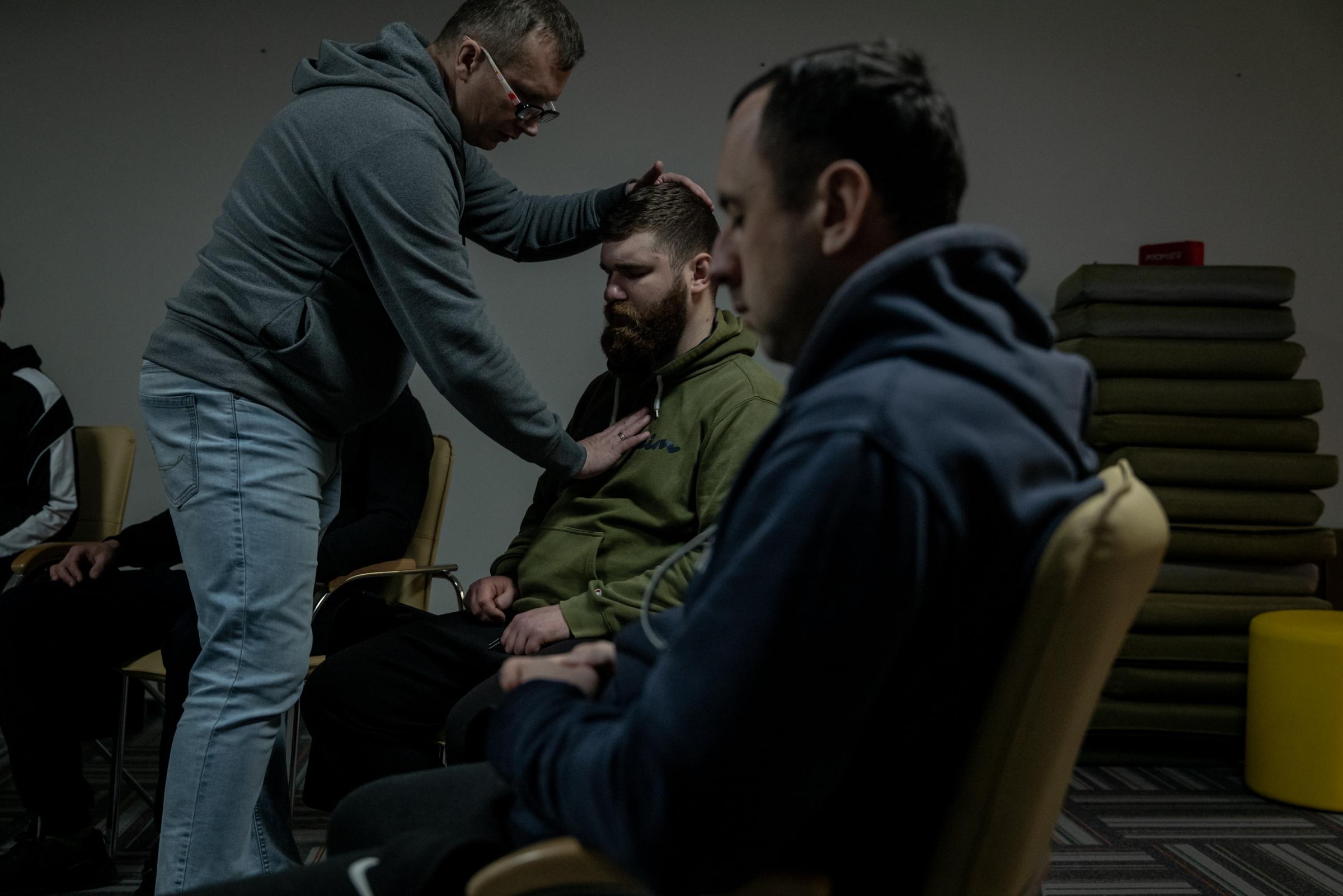
Ukrainian soldiers are seen during a group therapy session where psychotherapist Andriy Poltavtsev performed the bio suggestive therapy method at Lisova Polyana, a sanitarium where soldiers who have been fighting on the frontlines of war go for physical and mental rehabilitation, in Kyiv region. May 2023.
There is a crisis of wounded psyches, in addition to broken bodies, among Ukrainian soldiers. Exhausted physically and mentally, some soldiers have seen horrors on a daily basis that most civilians never do. At a handful of centers, soldiers receive an array of therapies, from talking to swimming to time with animals, to treat the invisible injuries. But those involved say the mental health needs of Ukraine’s troops are far greater than the available treatments, and will be around for years.
Continue reading here: https://www.nytimes.com/2023/08/15/world/europe/ukraine-war-soldiers-trauma-therapy.html
Continue reading here: https://www.nytimes.com/2023/08/15/world/europe/ukraine-war-soldiers-trauma-therapy.html
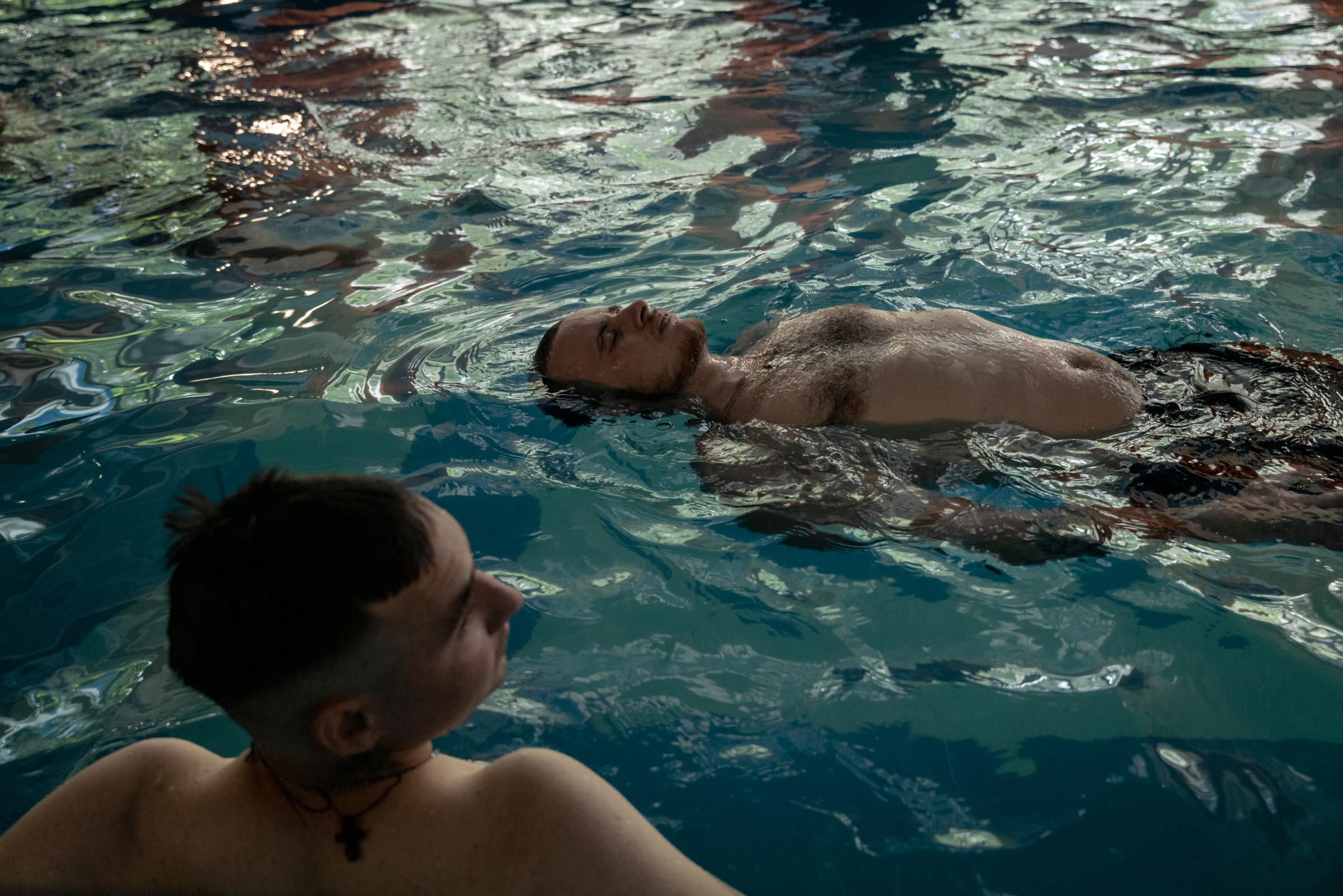
Ukrainian soldiers are seen in a pool during a session for aquatic therapy.
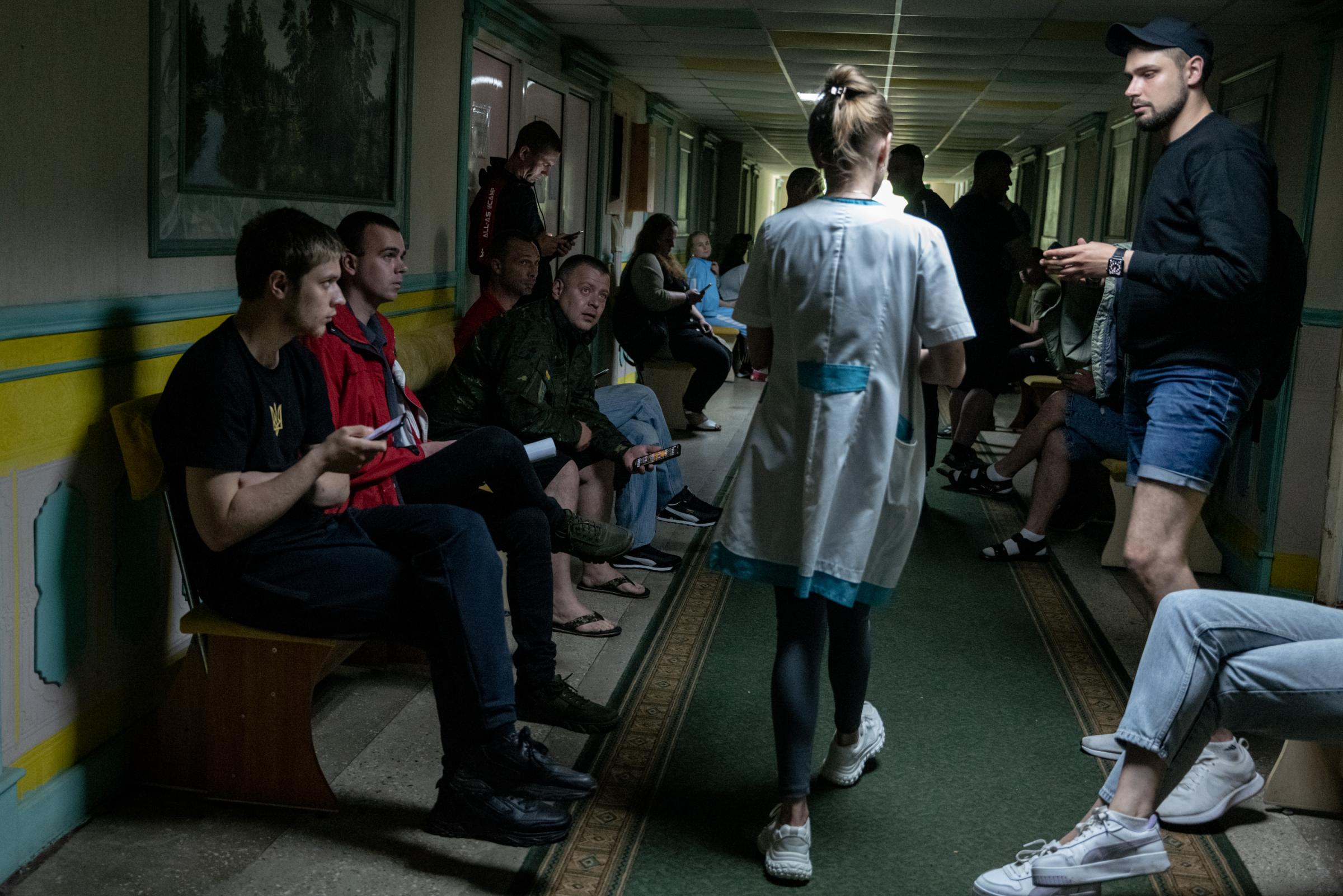
Ukrainian soldiers lined a hallway while waiting for various types of therapy at a sanitarium in Kharkiv region. The sanitarium provides various therapies for physical and mental wounds to help soldiers recover from their grinding and exhausting rotations on the frontlines of Ukraine.
Night brings little sleep and terrifying dreams. Day brings panic attacks and flashbacks. All are exhausted and some think of suicide. They fear their own thoughts, and what those thoughts might drive them to do.
Vladyslav Ruziev, a 28-year-old Ukrainian sergeant, has recurring nightmares about his experience being pinned down with his unit last winter, powerless to do anything about the constant Russian artillery, the bitter freeze, the comrades he saw lose arms and legs. “Sometimes the ground was so thick with the wounded that the evacuation vehicles drove over their bodies by mistake in the chaos,” he said, recalling scenes he witnessed on the front earlier this year.
In a year and a half of war, many of Ukraine’s troops have had breaks totaling only about two weeks. And when they do get short respites away from the front, what many of them need most is treatment for psychological trauma.
Vladyslav Ruziev, a 28-year-old Ukrainian sergeant, has recurring nightmares about his experience being pinned down with his unit last winter, powerless to do anything about the constant Russian artillery, the bitter freeze, the comrades he saw lose arms and legs. “Sometimes the ground was so thick with the wounded that the evacuation vehicles drove over their bodies by mistake in the chaos,” he said, recalling scenes he witnessed on the front earlier this year.
In a year and a half of war, many of Ukraine’s troops have had breaks totaling only about two weeks. And when they do get short respites away from the front, what many of them need most is treatment for psychological trauma.
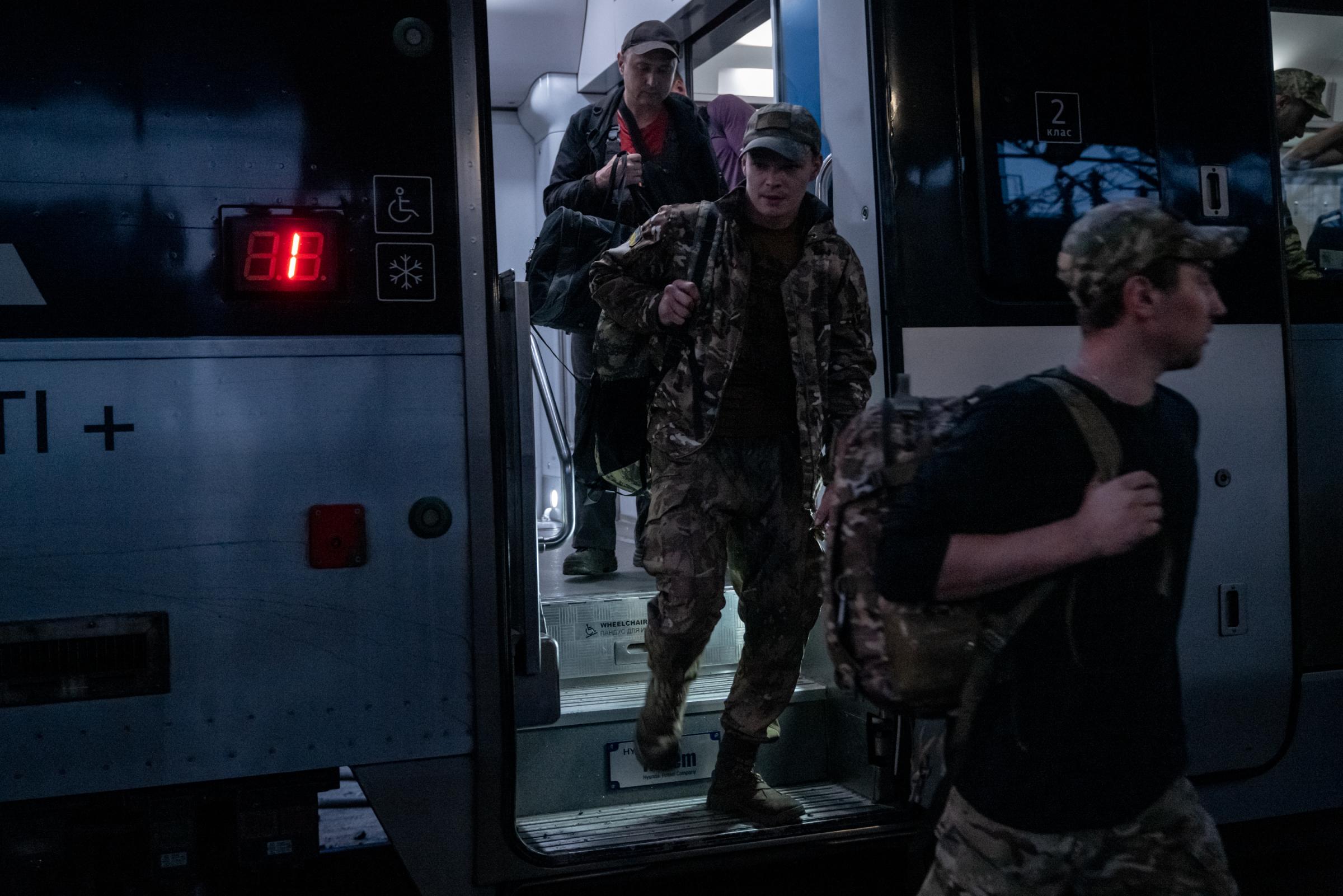
Ukrainian soldiers returning from the country’s east are seen at the central railway station in Kyiv.
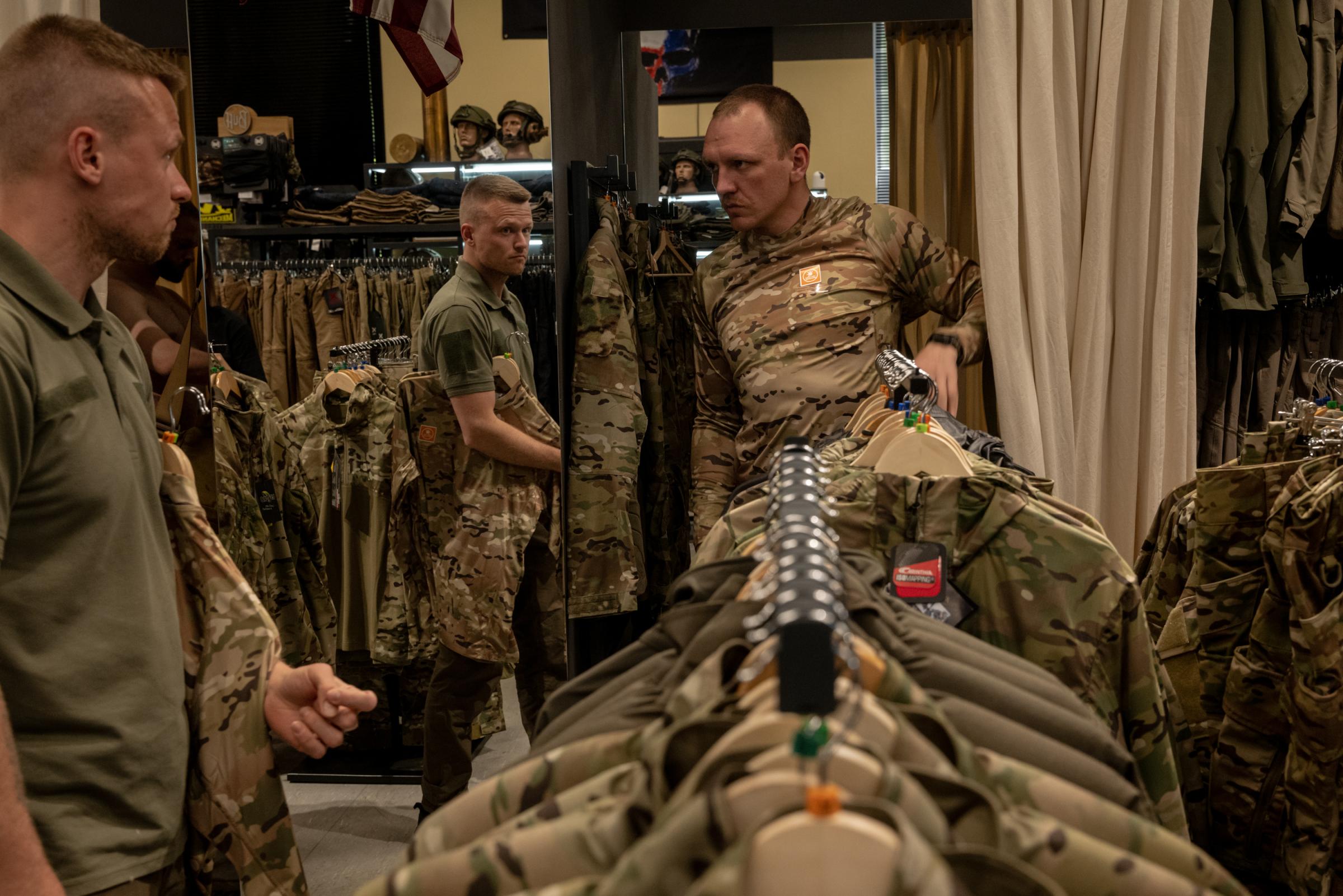
Andriy Remezov (center), 34, a commander of an air intelligence unit of Ukraine’s 79th Brigade, shopped for summer fatigues while on a two-day break following his return from the the Donetsk region, where he was serving with his brigade just outside of Marinka - a now destroyed town - in Kyiv. Andriy served in the Ukrainian military in 2014 after the start of the Russian separatist war there.
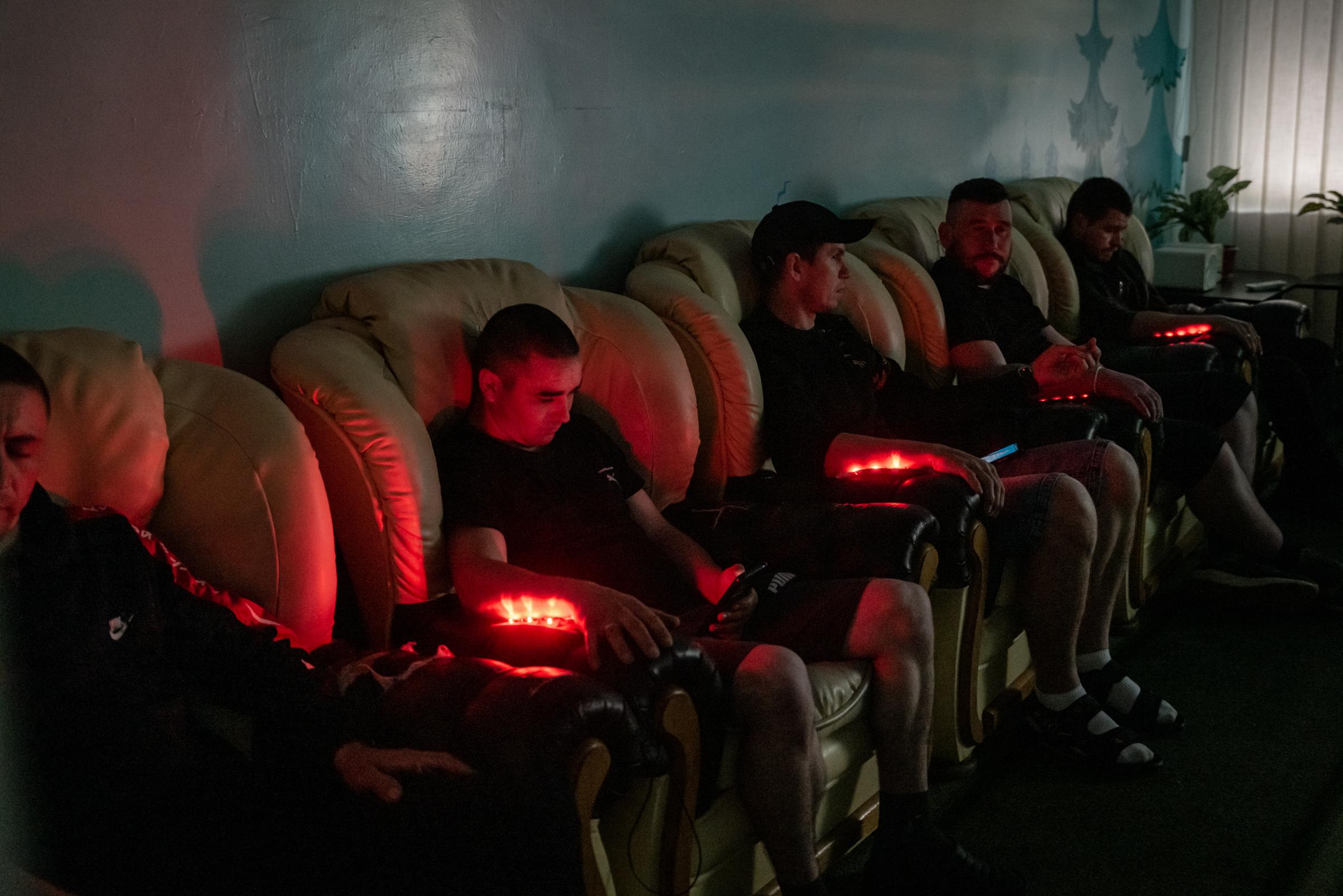
Ukrainian soldiers sat in a room while receiving laser therapy to help improve blood circulation at a sanitarium. The sanitarium provides various therapies for physical and mental wounds to help soldiers recover from their grinding and exhausting rotations on the frontlines of Ukraine.
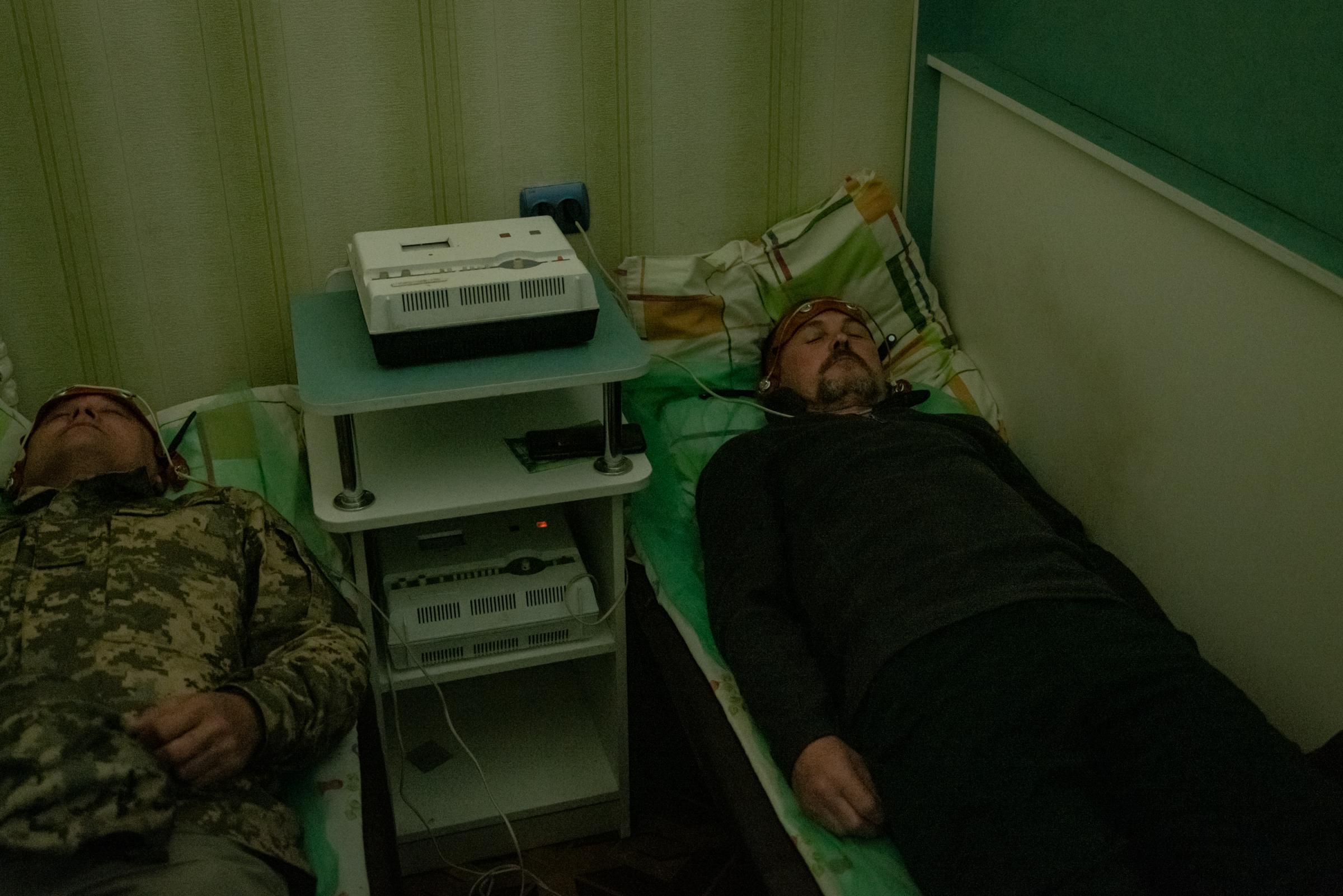
Ukrainian soldiers received treatment via micro amperes, or electrical currents, placed on their head to help them relax and improve blood circulation.
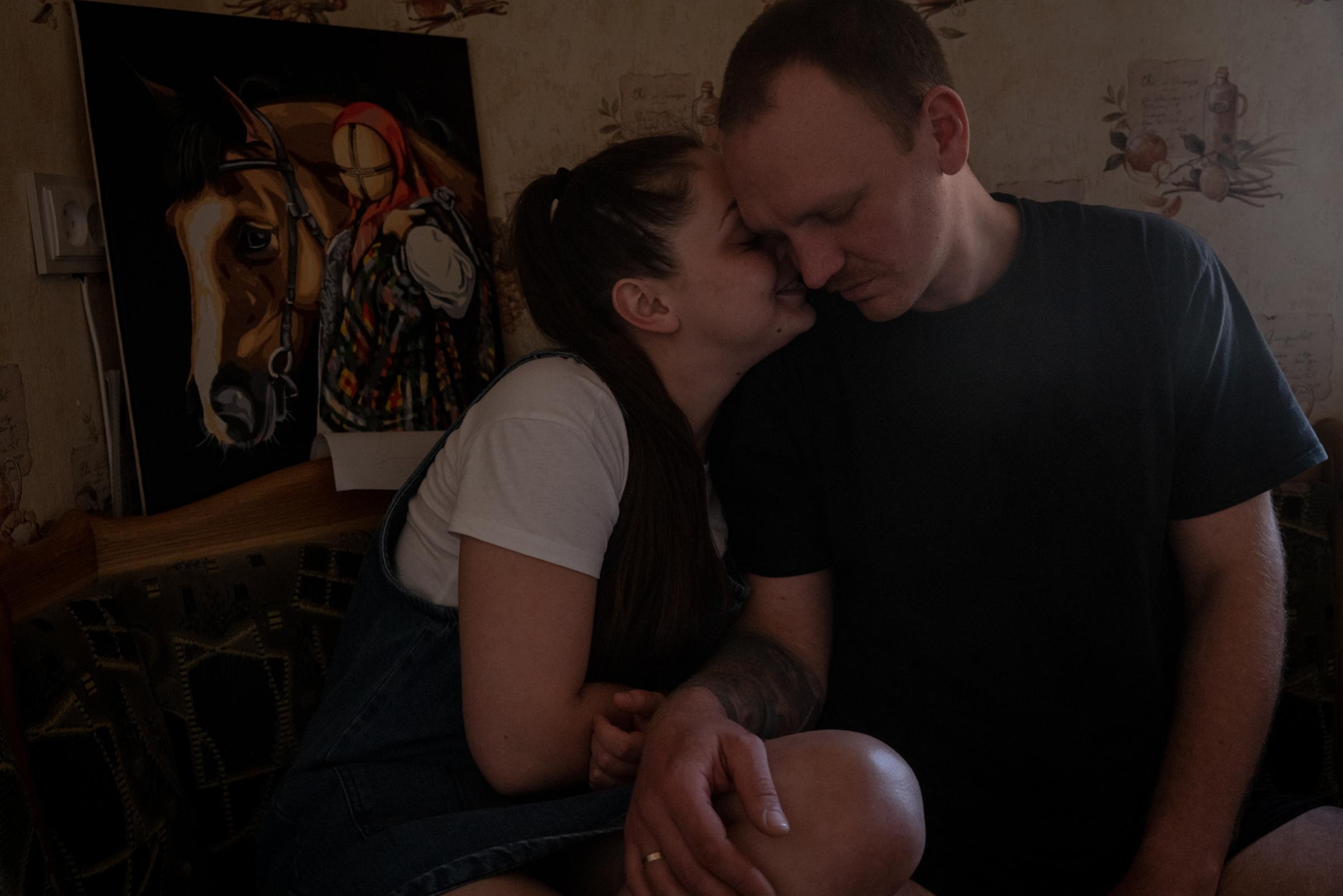
Andriy Remezov, 34, a commander of an air intelligence unit of Ukraine’s 79th Brigade, is seen in the kitchen of his home on a two-day break with his wife Marharyta Klyshkan, 26, the morning after he returned from the the Donetsk region, where he was serving with his brigade just outside of Marinka - a now destroyed town - in Kyiv. Andriy served in the Ukrainian military in 2014 after the start of the Russian separatist war there.
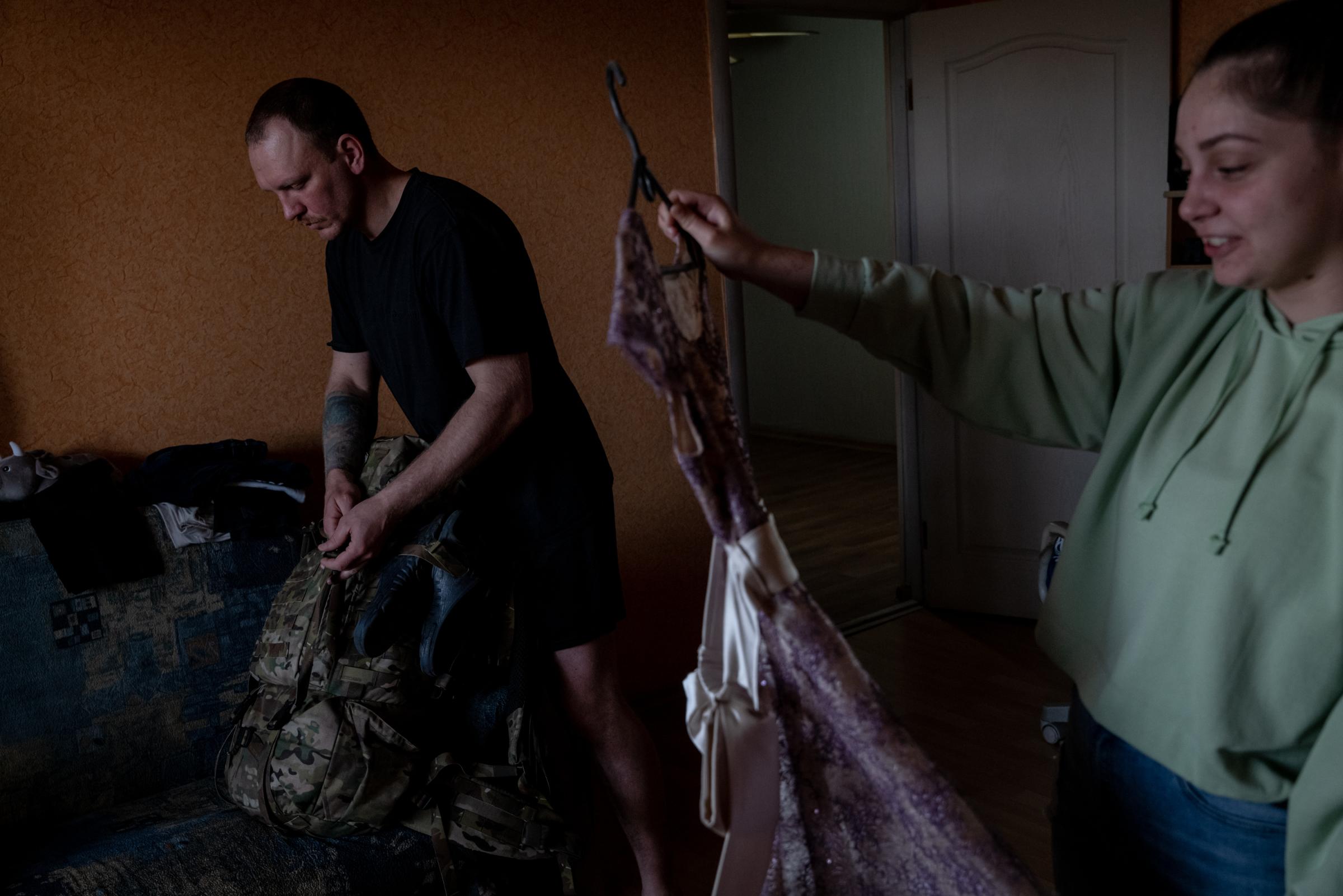
Andriy Remezov, 34, a commander of an air intelligence unit of Ukraine's 79 Brigade, packed clothing and equipment in preparation for his departure again to the frontline in eastern Ukraine, following a two-day break at home with his wife Marharyta Klyshkan, 26, in Kyiv. Andriy, who is now back on the front with his brigade situated outside of Marinka, served in the Ukrainian military in 2014 after the start of the Russian separatist war there.
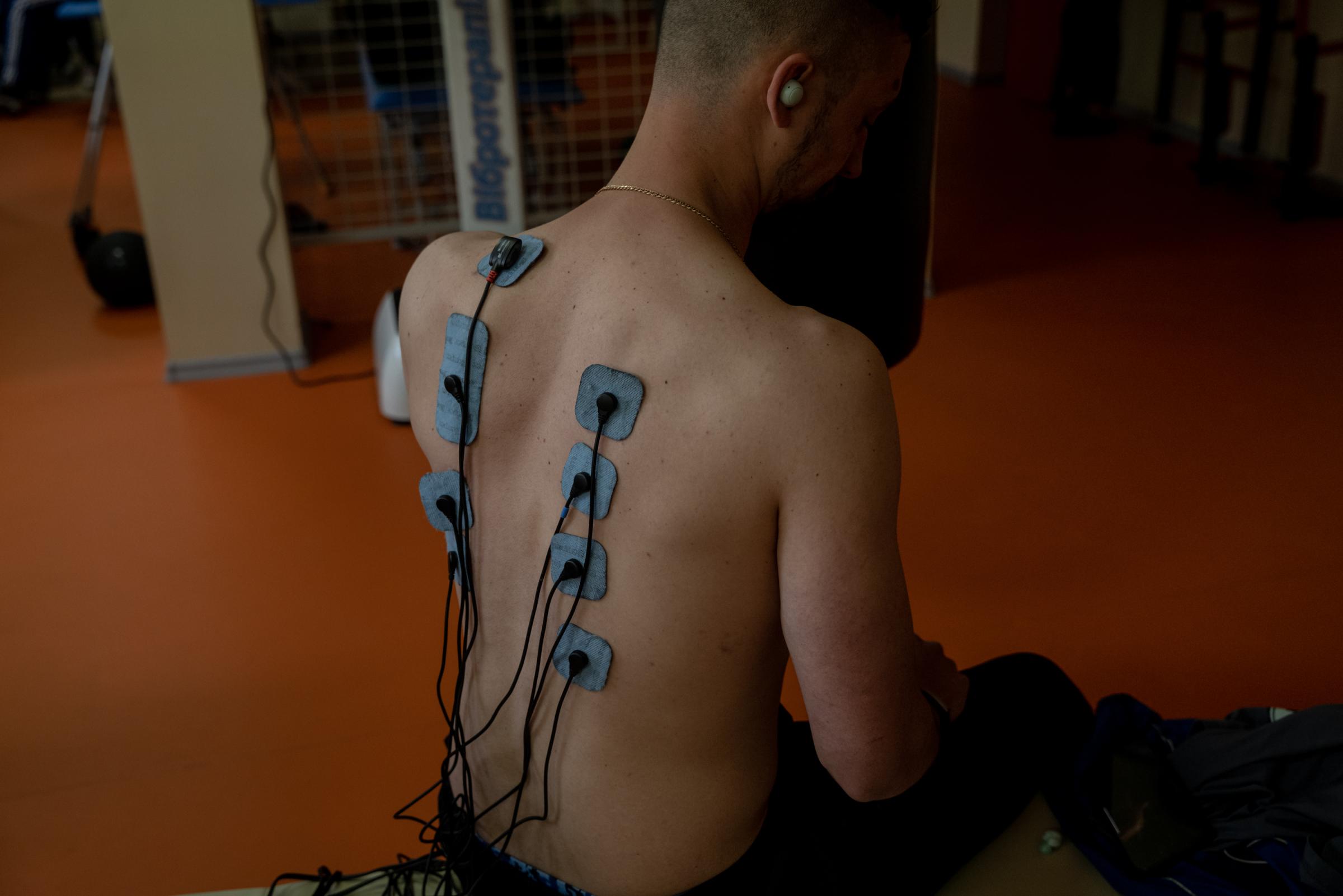
Dima, 28, has electrotherapy for wounds suffered in Russian captivity, at Lisova Polyana hospital in Kyiv.
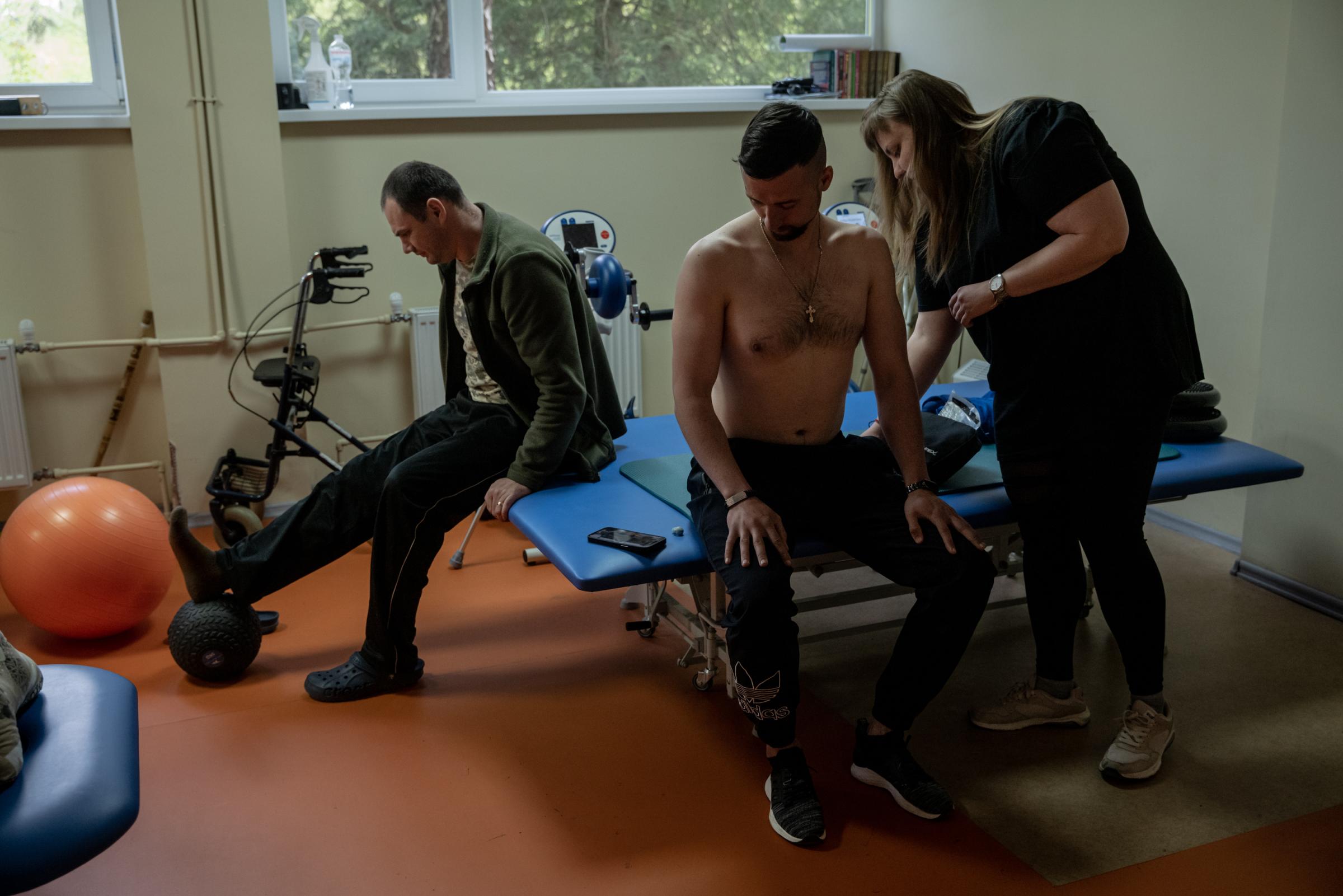
Ukrainian soldiers were assisted by a physical therapist at a therapy session at Lisova Polyana, a national veterans' mental health and rehabilitation hospital.
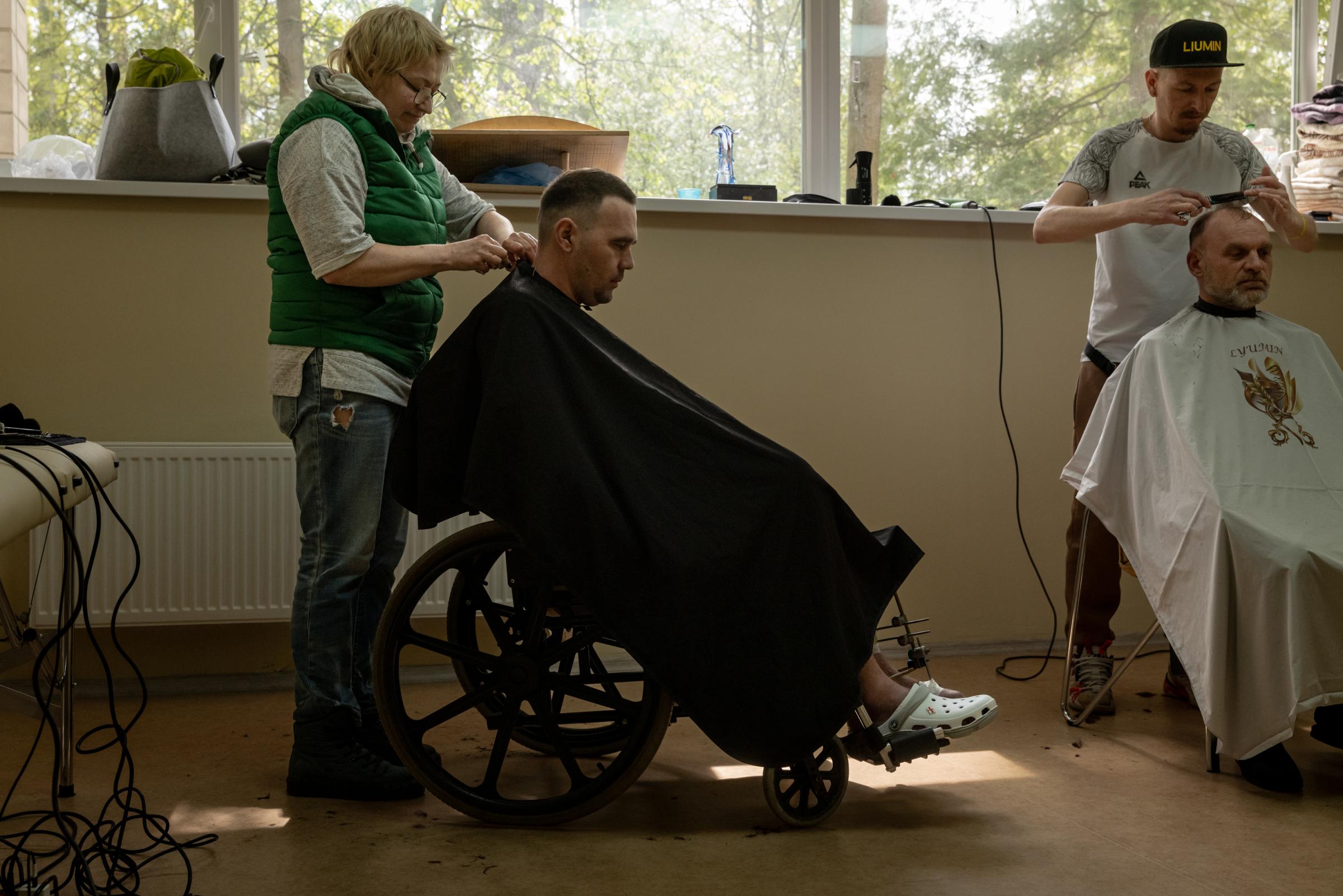
Even a haircut is seen at the hospital as therapeutic, giving troops a bit of care and attention from a stranger.
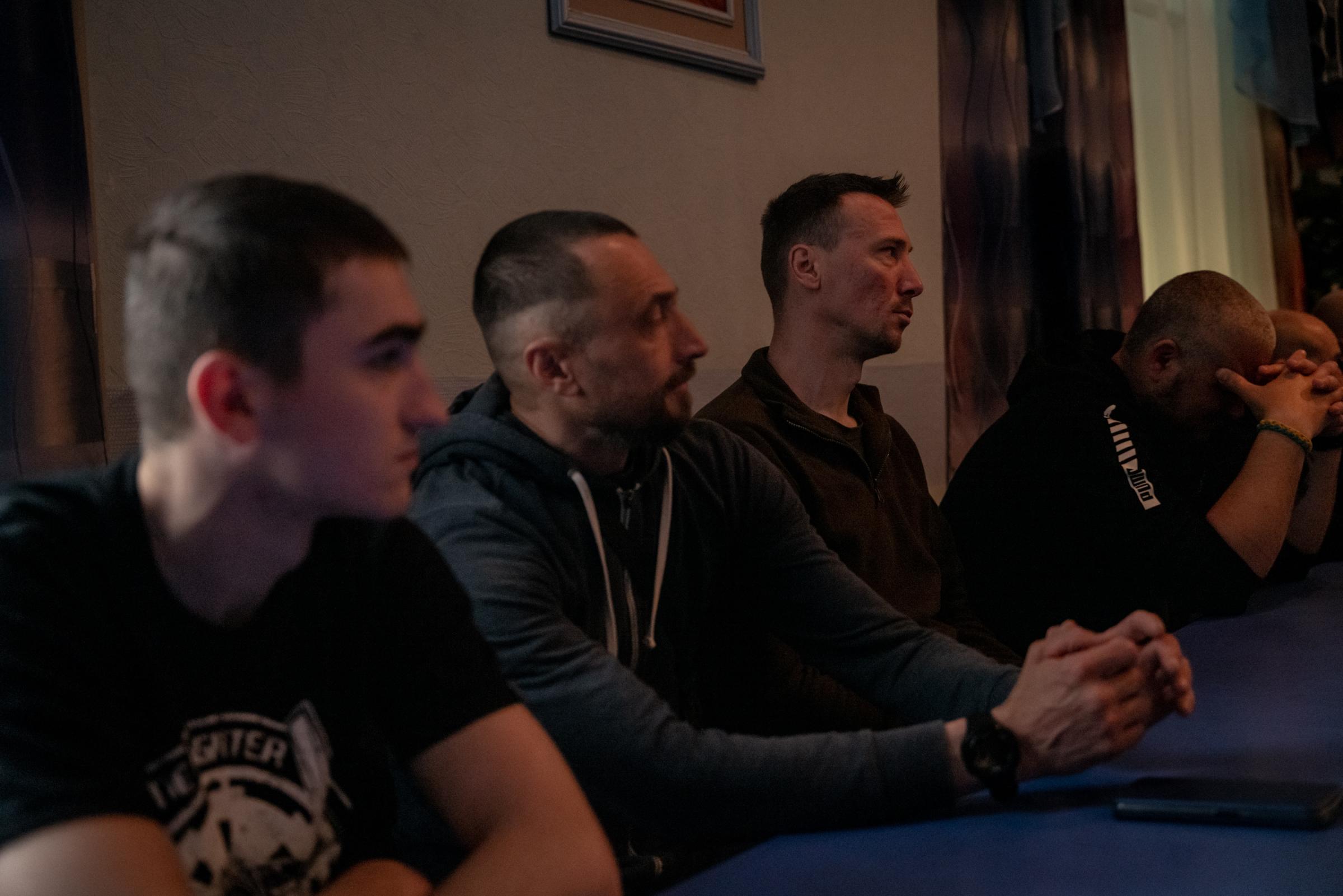
Maksym, center right, is tormented by vivid memories of the front but wants to return, seeing it as the only place he belongs. On a previous rotation away from the front line, Maksym, 35, attacked his roommate during the night, thinking the other soldier was a Russian enemy. After that he insisted on having a room to himself.
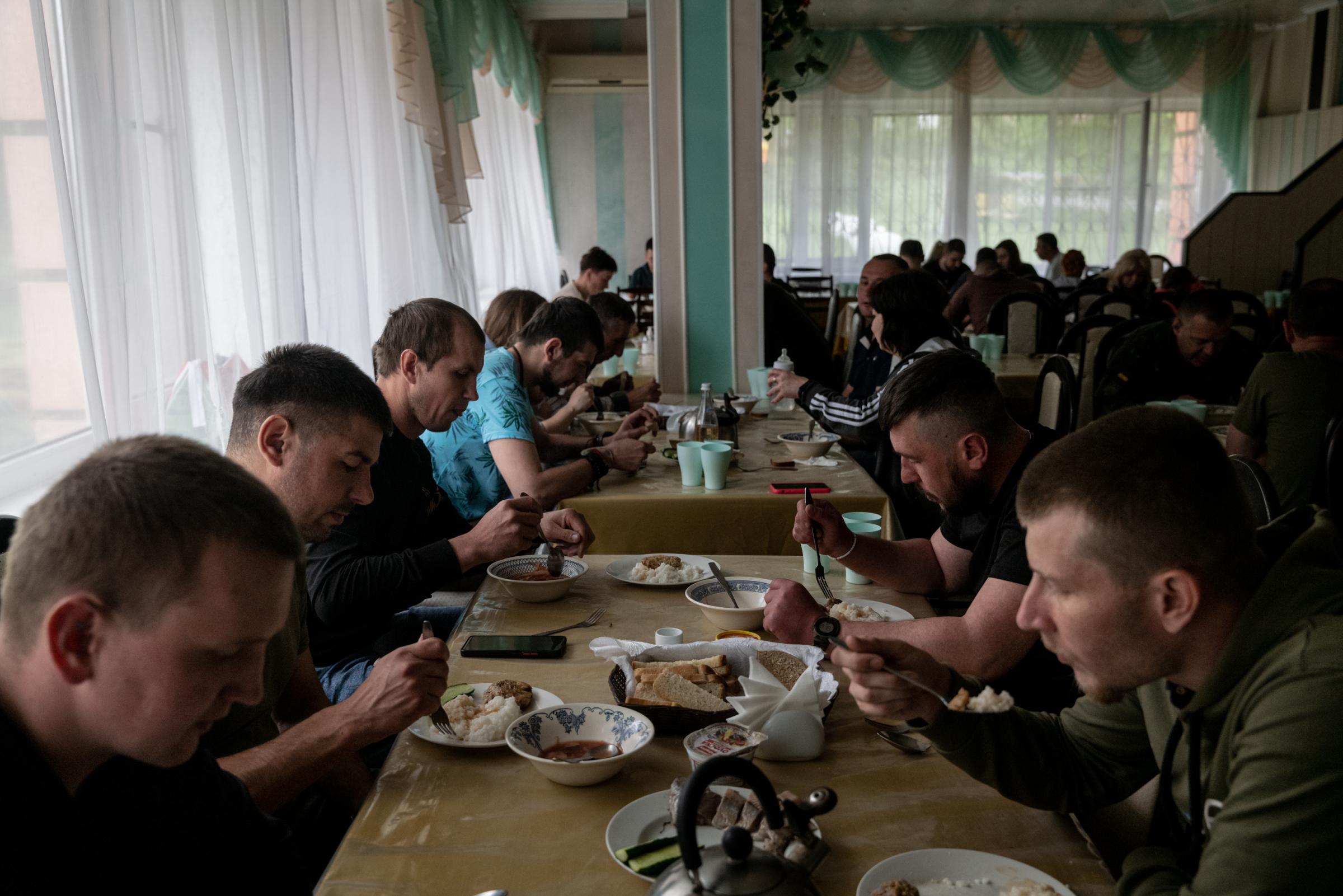
Ukrainian service member during lunch at a sanitarium in northern eastern Ukraine.The sanitarium provides various therapies for physical and mental wounds to help soldiers recover from their grinding and exhausting rotations on the frontlines of Ukraine.
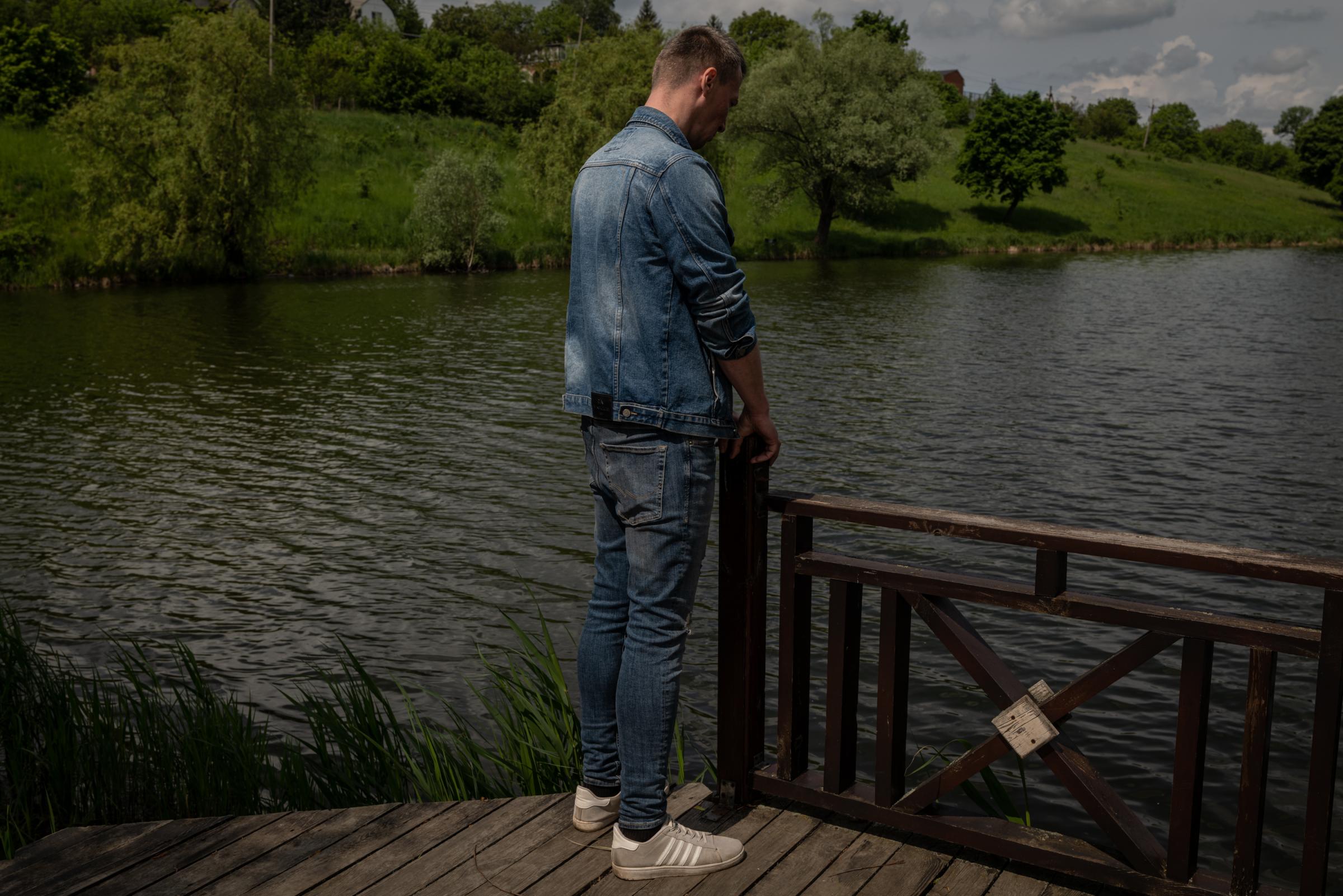
Maksym, center right, is tormented by vivid memories of the front but wants to return, seeing it as the only place he belongs. “We lost most of the men in my unit,” he said. “I cry sometimes. When I’m falling asleep, I can visualize it all over again.” He added, “I remember the faces of all our dead comrades.”
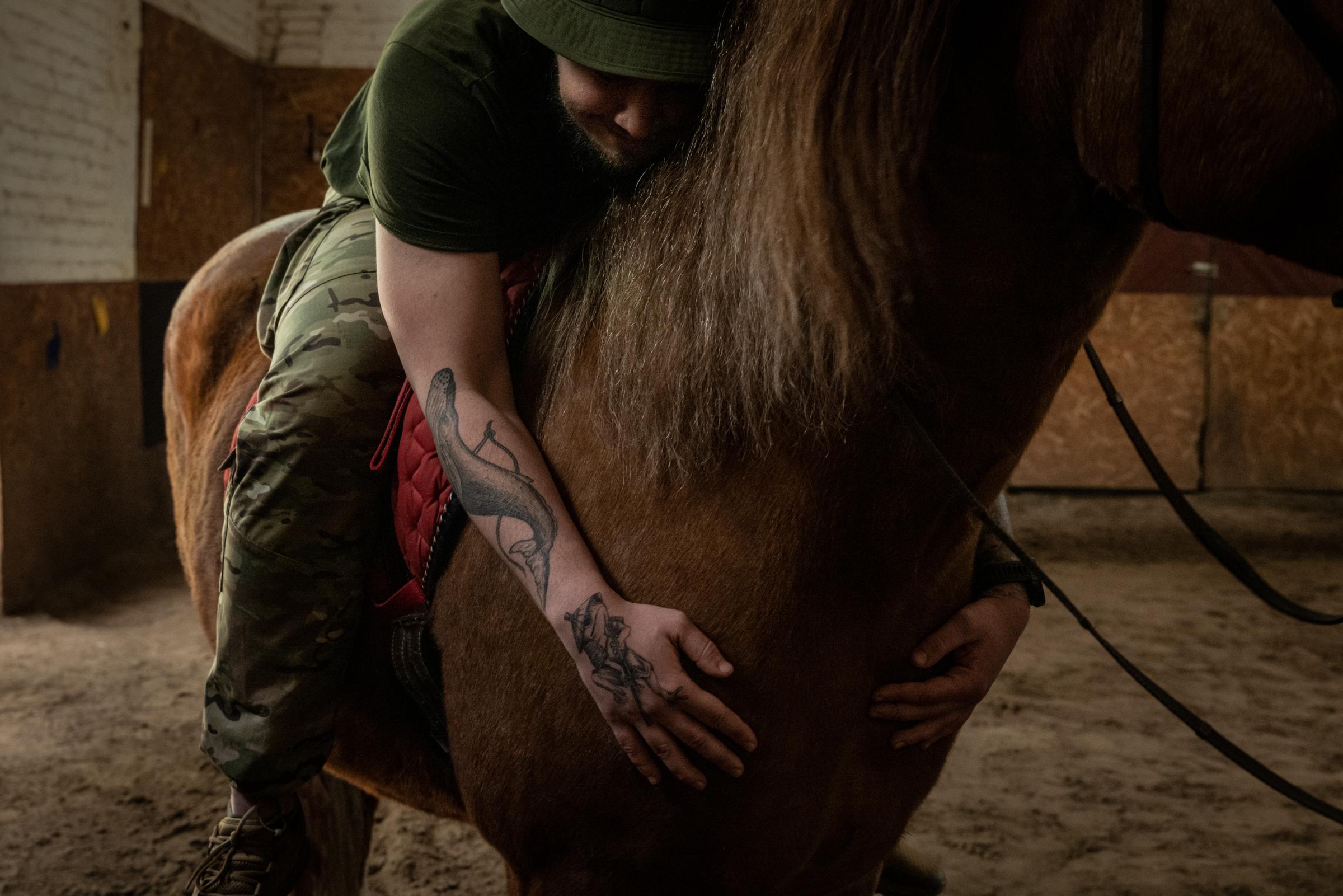
A Ukrainian soldier hugs the horse he is on during a hippotherapy session at Spirit Hippotherapy Center, where soldiers undergo horse therapy to relieve stress as part of their mental recovery, away from the frontlines, in Kyiv. Veterans find that contact with horses and dogs helps with trauma, calming and distracting their minds.
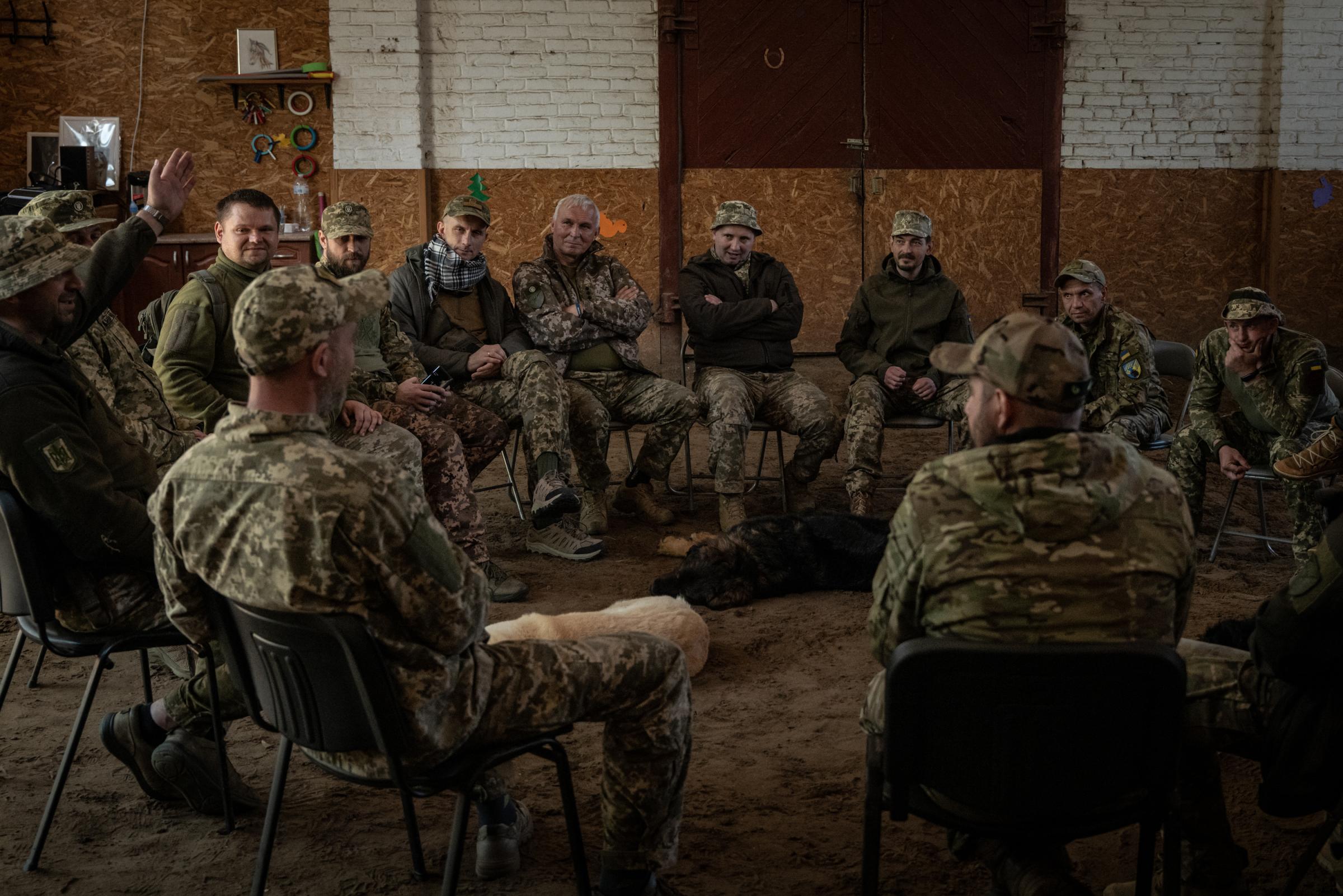
Ukrainian soldiers sat in a circle as part of their group discussion after riding horses at Spirit Hippotherapy Center, where soldiers undergo horse therapy to relieve stress through mental recovery, away from the frontlines, in Kyiv. After riding a horse in Kyiv, a soldier said it made him happy, a feeling he thought he would never have.
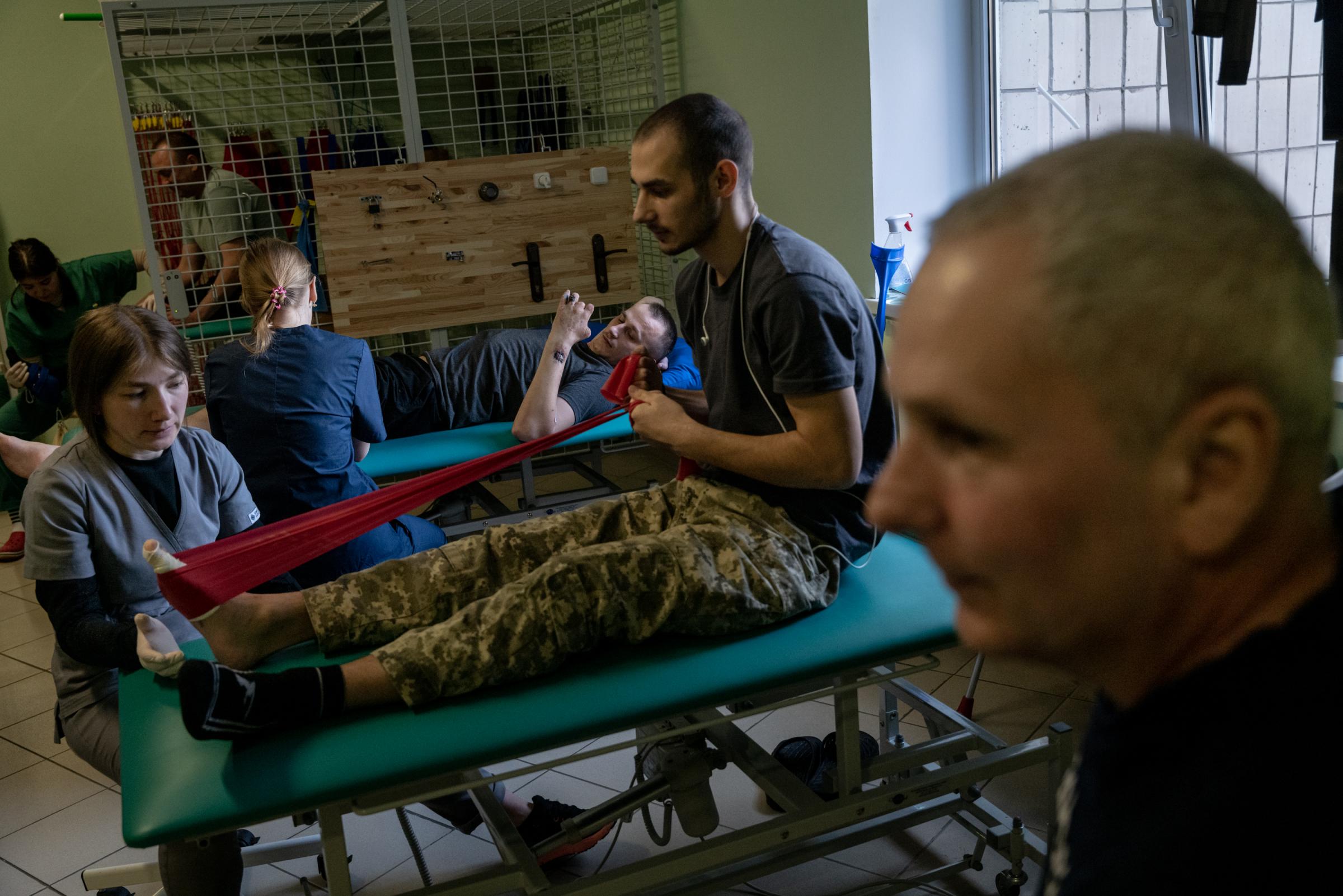
Ukrainian service members are seen during a physical therapy session at the Central Hospital of the Ministry of Internal Affairs of Ukraine, in Kyiv. The hospital provides physical and mental rehabilitation for traumatized and wounded soldiers.
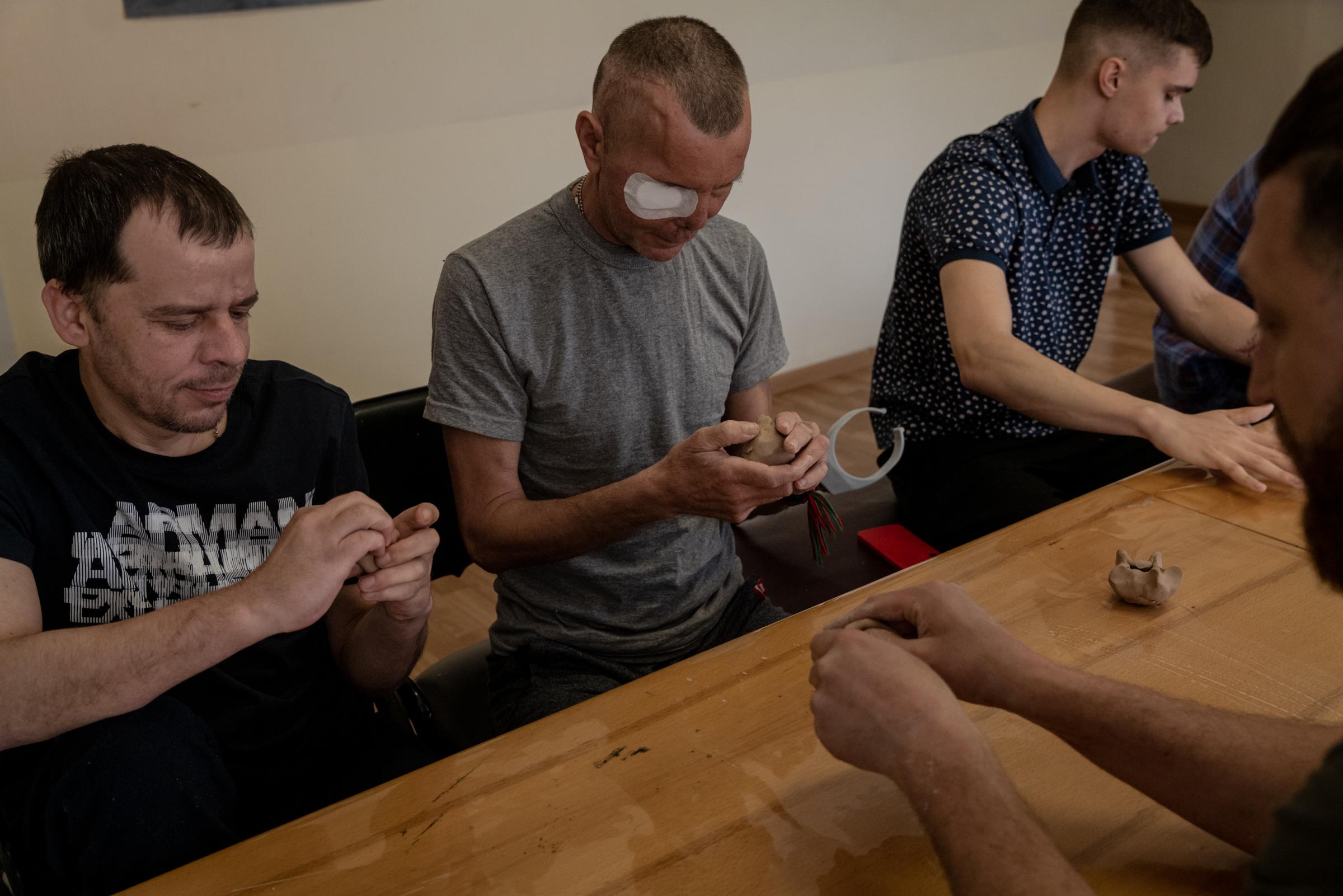
Ukrainian service members are seen during a pottery and art session at the Central Hospital of the Ministry of Internal Affairs of Ukraine, in Kyiv, where soldiers were receiving physical and mental rehabilitation.
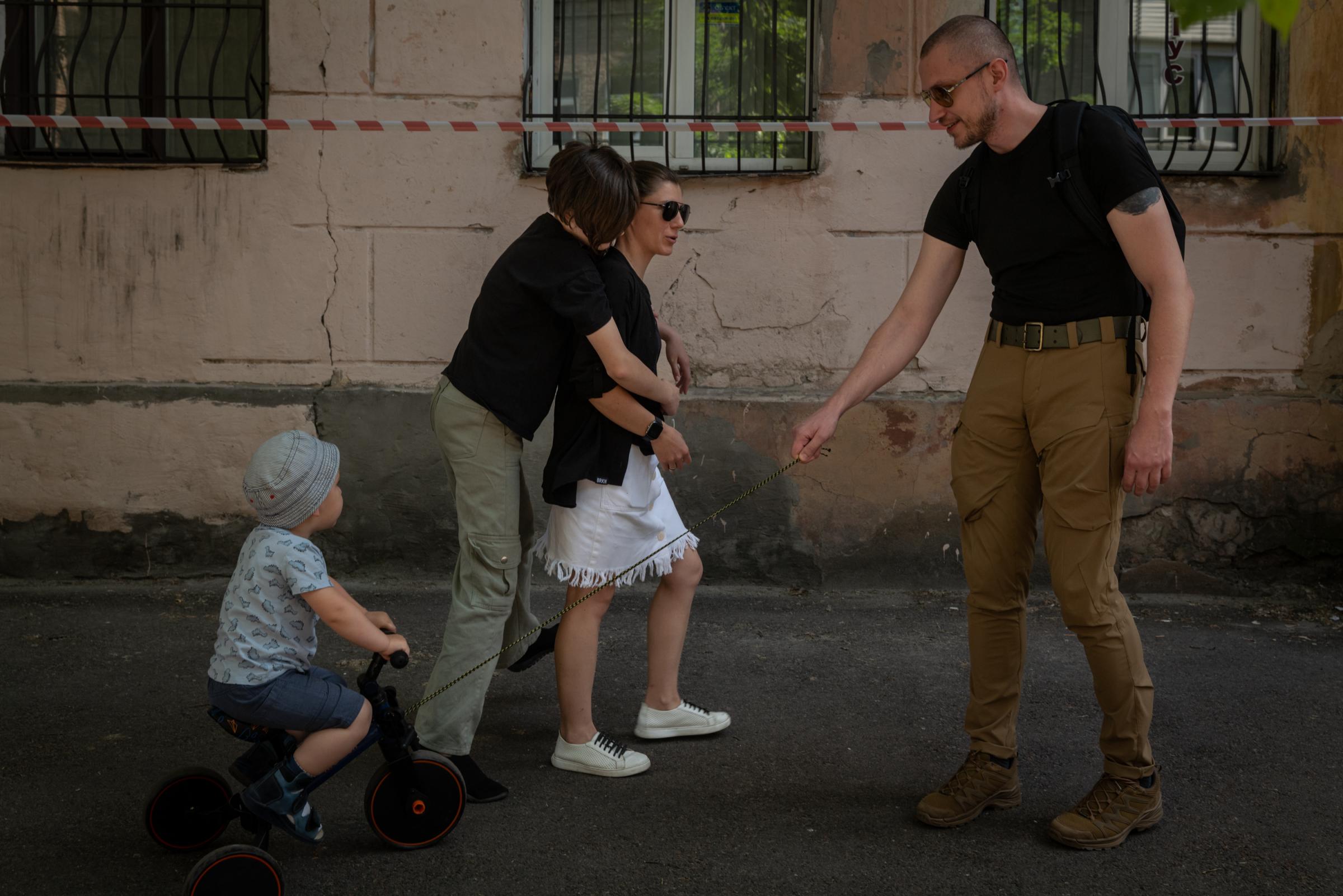
Ukrainian military surgeon Oleksiy Kotlyarov, 36, walked in the Podil neighborhood with his wife Nataliya Kotlyarova, 34, their son Sviatoslav, 2, and daughter Romana, 12, during a rare 10-day leave from his posting at a stabilization point treating wounded soldiers in the fight for Bakhmut, as seen in Kyiv. Oleksiy has been working to stabilize and operate on injured soldiers since the start of Russian invasion.
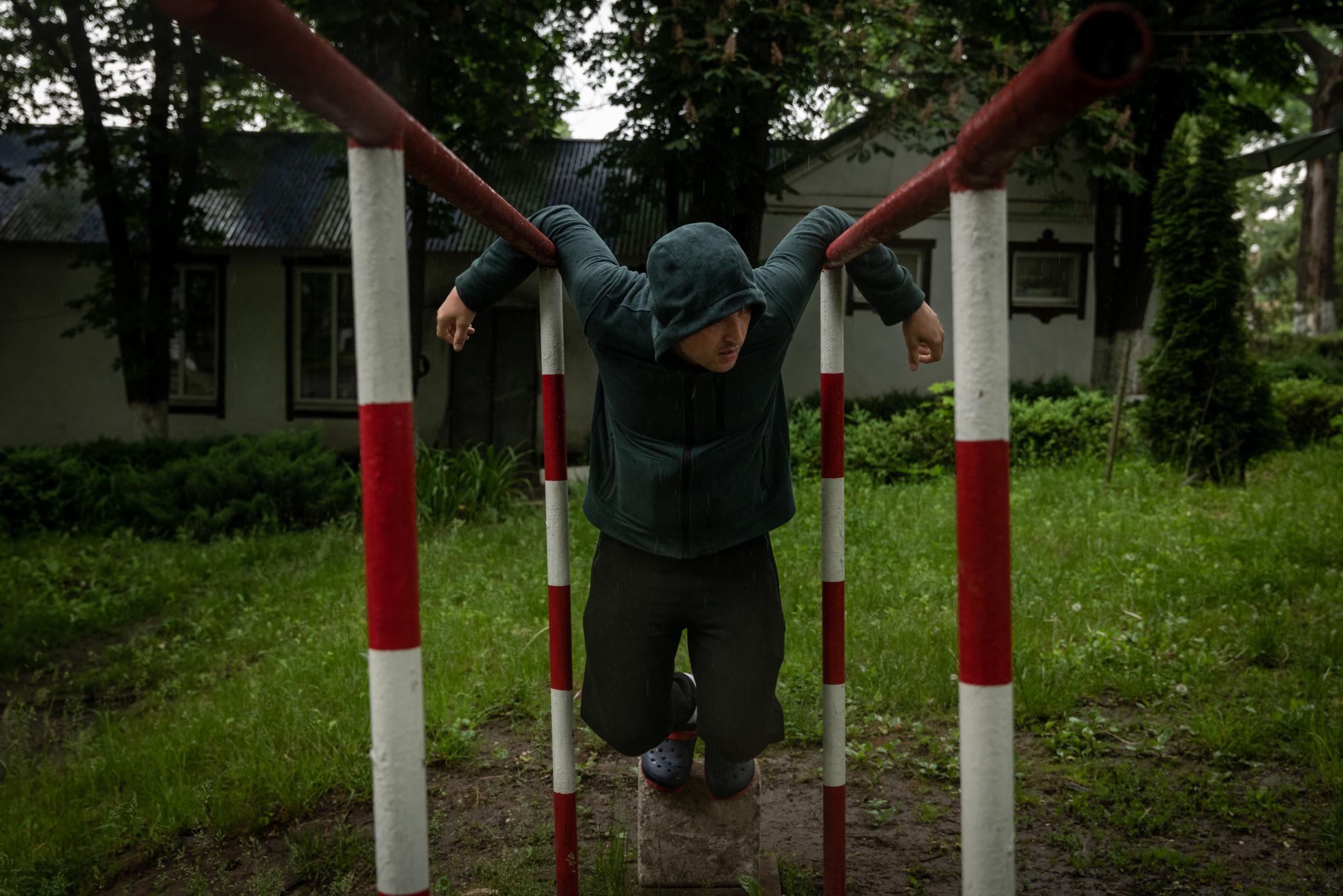
Vladyslav Ruziev is seen during a break in various therapy sessions at a sanitarium. The 28-year-old Ukrainian sergeant has recurring nightmares about his experience being pinned down with his unit last winter, powerless to do anything about the constant Russian artillery, the bitter freeze, the comrades he saw lose arms and legs. “Sometimes the ground was so thick with the wounded that the evacuation vehicles drove over their bodies by mistake in the chaos,” he said, recalling scenes he witnessed on the front earlier this year.
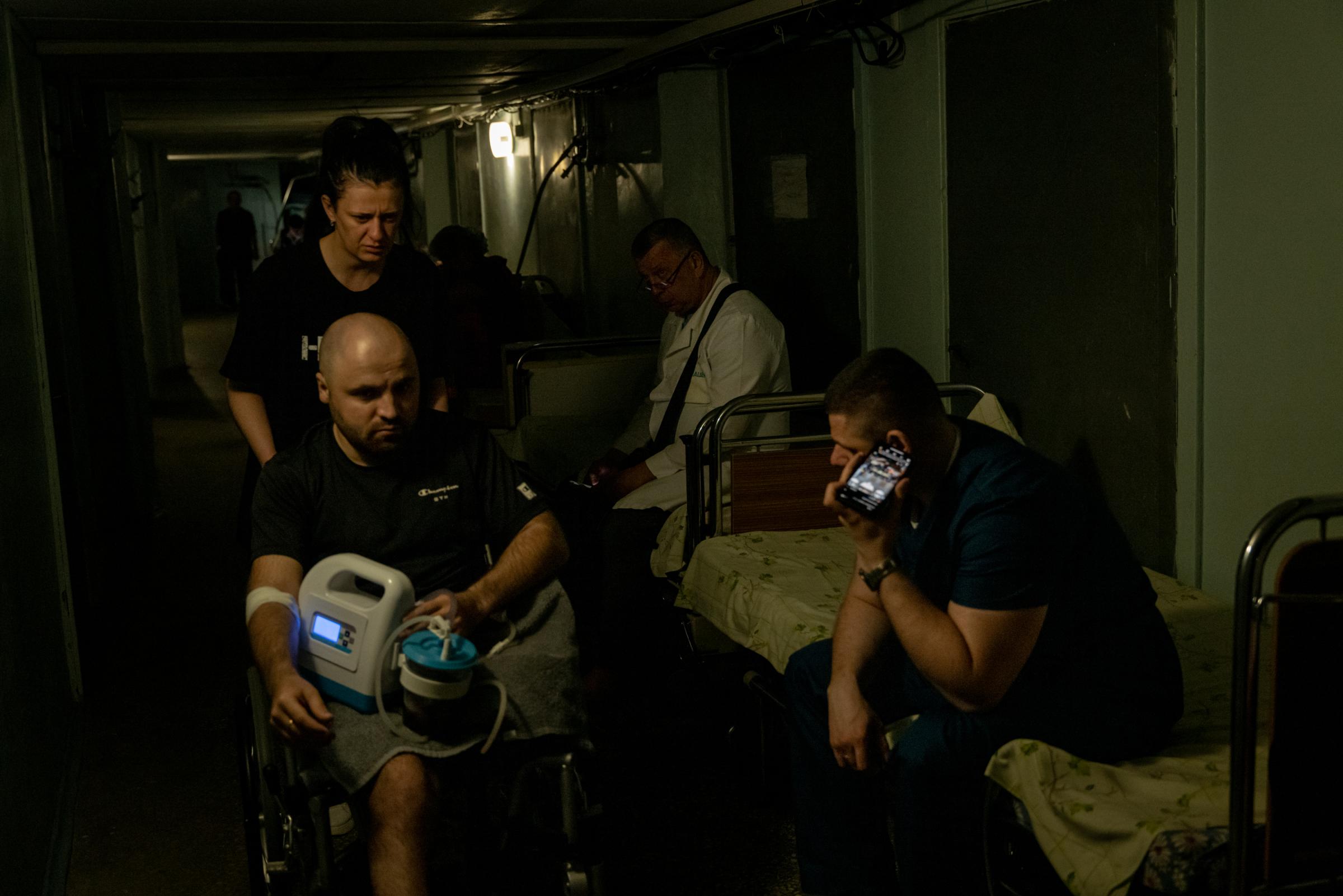
A wounded Ukrainian service member is seen sheltering in the basement of the Central Hospital of the Ministry of Internal Affairs of Ukraine, in Kyiv during an air raid alert following explosions across the capital as Russia launched another wave of attacks, which interrupted therapy sessions for soldiers.